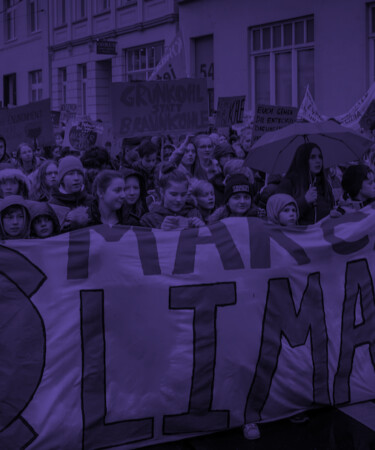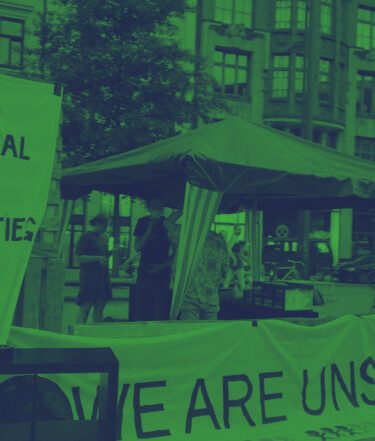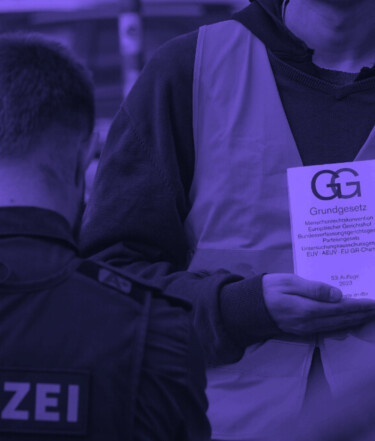
NRW Assembly Act: Threat to freedom of assembly and civilsociety
We file a constitutional complaint against the massive restriction of the fundamental right to freedom of assembly in North Rhine-Westphalia.
"The North Rhine-Westphalia Assembly Act is an open breach of constitutional case law on freedom of assembly. Freedom of assembly is a fundamental right for democratic civil society - the state must not restrict it in such a way that social discourse is prevented."
In North Rhine-Westphalia, a new Assembly Act came into force on January 7, 2022 (VersG NRW). In it, assemblies are no longer understood as a social expression of opinion and a fundamental democratic right, but as a source of danger. In order to control this supposed danger, the VersG NRW massively restricts fundamental rights at several points. This represents an unprecedented departure from the decades-old, pro-assembly case law of the Federal Constitutional Court.
Criminalization, video surveillance and blanket bans on assemblies
Our constitutional complaint is directed against numerous regulations of the Assembly Act, which in our view are unconstitutional:
- Criminalization of demonstrators: The VersG NRW contains a number of punishable prohibitions that criminalize peaceful behavior. The disruption of other assemblies, even through communicative counter-protests or peaceful blockades, is prohibited, as are purely preliminary actions such as blockade training (§ 7 VersG NRW). The law also contains a ban on masking and protective equipment (§§ 17, 27 para. 7 VersG NRW) as well as a ban on uniforms and militancy (§ 27 para. 8 VersG NRW). It is particularly problematic that the prohibitions are extremely far-reaching and at the same time vaguely formulated. With such unclear regulations, it is not clear to demonstrators what behavior might make them liable to prosecution.
- Expansion of video surveillance: A considerable deterrent effect results from the authority to make open and covert video recordings of assemblies (§ 16 VersG NRW). The recordings may also be subsequently stored and used for the prosecution of criminal offenses unrelated to the assembly. If people have to assume that their political involvement will be monitored by the police in this way, they may no longer take part in demonstrations at all.
- Blanket ban on assemblies on freeways: The blanket ban on assemblies on federal highways (Section 13 (1) sentence 3 VersG NRW) is without precedent in a nationwide comparison. Nowhere else in Germany is there such a total ban, which in principle excludes a certain part of the public space from the freedom of assembly. Federal highways in NRW are thus even under stronger protection than the NRW state parliament or Nazi memorials such as a former concentration camp. However, the free choice of the place of assembly is part of the fundamental right of freedom of assembly.
Defending civil society's room for maneuver
These tightenings through various criminal offenses and far-reaching state surveillance create enormous insecurity for demonstrators. The individual regulations already violate the fundamental right to freedom of assembly. In addition, demonstrators are often confronted with several of these interventions at the same time. In combination, this results in an enormous deterrent and intimidating effect. No other federal state has passed such a restrictive assembly law. The regulations in NRW do not just affect individuals: They intimidate people and thus drive parts of society out of democratic discourse. We want to prevent such developments.
Climate justice instead of repression
The fundamental right to freedom of assembly is constantly evolving - as are civil society forms of protest. The climate movement in particular is trying to persuade politicians to take decisive action with new and diverse ideas for action. But time and again, peaceful climate protests are restricted and criminalized by the state, be it through preventive detention for climate activists in Bavaria, framing as "climate RAF" by leading politicians, or official bans on climate camps.
The VersG NRW is also explicitly directed against the climate movement. The tightening of the ban on militancy is justified in the justification of the law with the protests of the climate movement against the Garzweiler open pit mine and is aimed in particular at climate protests. The nationwide unique ban on assemblies on highways is also clearly directed against activists who interrupt car traffic to draw attention to the worsening climate crisis. Especially in view of the social importance of this commitment, it is unacceptable that the NRW legislature unconstitutionally restricts the basic rights of activists.
In our constitutional complaint, we are working together with the Action Alliance Stop Assembly Law NRW, which includes a broad spectrum of civil society organizations in NRW, from the RAV to climate organizations, the ADFC and trade unions. The constitutional complaint is written by Prof. Dr. Tristan Barczak, LL.M.



